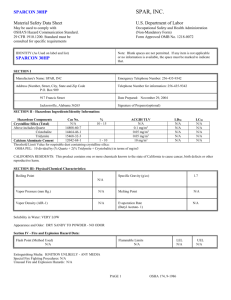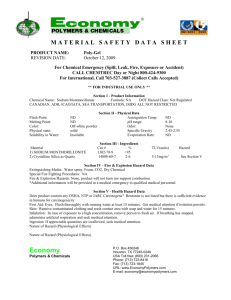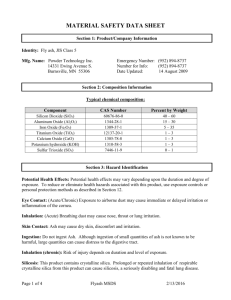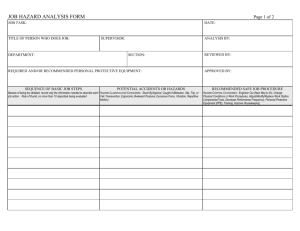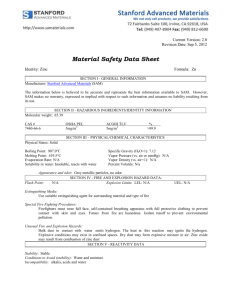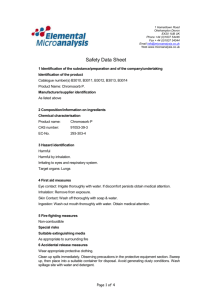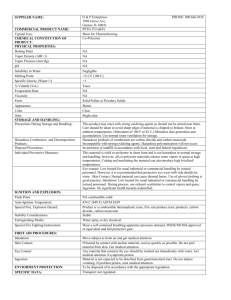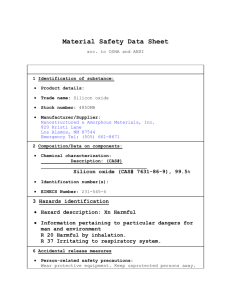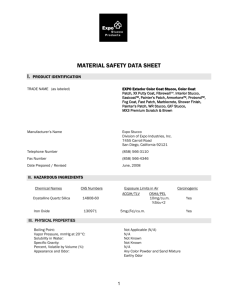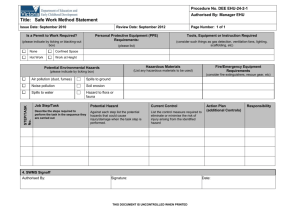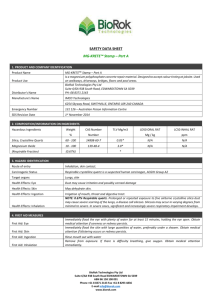material safety data sheet - mesa.avc
advertisement
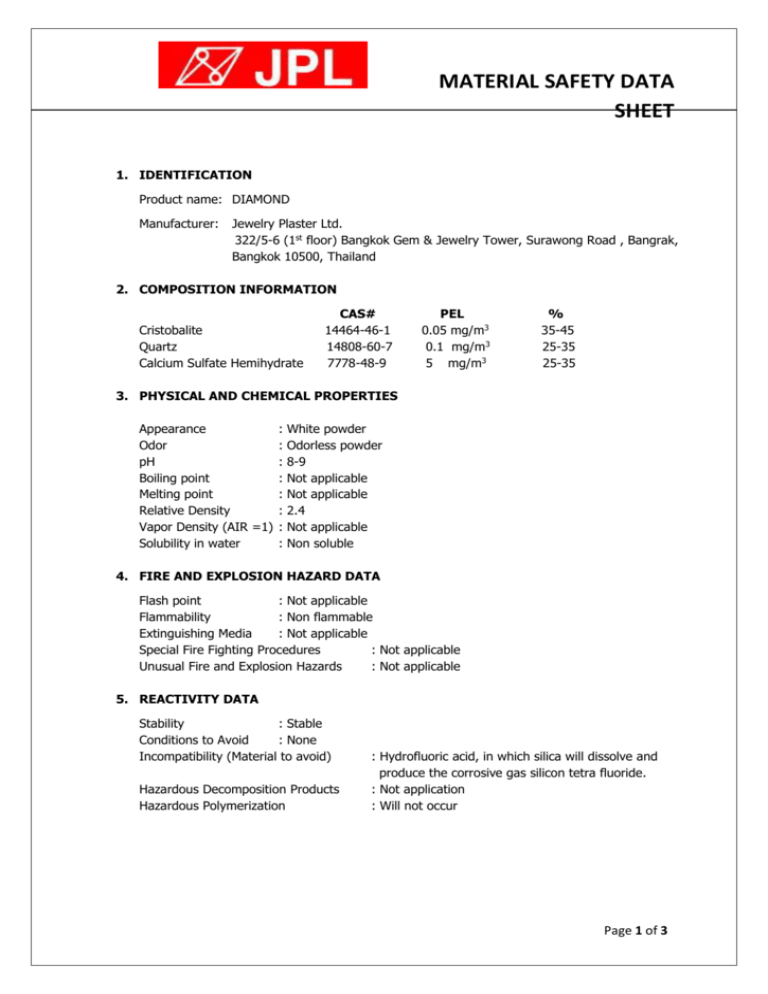
MATERIAL SAFETY DATA SHEET 1. IDENTIFICATION Product name: DIAMOND Manufacturer: Jewelry Plaster Ltd. 322/5-6 (1st floor) Bangkok Gem & Jewelry Tower, Surawong Road , Bangrak, Bangkok 10500, Thailand 2. COMPOSITION INFORMATION Cristobalite Quartz Calcium Sulfate Hemihydrate CAS# 14464-46-1 14808-60-7 7778-48-9 PEL 0.05 mg/m3 0.1 mg/m3 5 mg/m3 % 35-45 25-35 25-35 3. PHYSICAL AND CHEMICAL PROPERTIES Appearance : Odor : pH : Boiling point : Melting point : Relative Density : Vapor Density (AIR =1) : Solubility in water : White powder Odorless powder 8-9 Not applicable Not applicable 2.4 Not applicable Non soluble 4. FIRE AND EXPLOSION HAZARD DATA Flash point : Not applicable Flammability : Non flammable Extinguishing Media : Not applicable Special Fire Fighting Procedures : Not applicable Unusual Fire and Explosion Hazards : Not applicable 5. REACTIVITY DATA Stability : Stable Conditions to Avoid : None Incompatibility (Material to avoid) Hazardous Decomposition Products Hazardous Polymerization : Hydrofluoric acid, in which silica will dissolve and produce the corrosive gas silicon tetra fluoride. : Not application : Will not occur Page 1 of 3 MATERIAL SAFETY DATA SHEET 6. HEALTH HAZARD DATA Skin Eyes Inhalation : May cause dry feeling on skin : May cause irritation : Prolonged exposure to respirable crystalline silica may cause chronic lung injury (silicosis). Acute developing silicosis may occur in a short time in a heavy exposure. There is limited evidence that suggests that crystalline silica may cause cancer in humans. Ingestion : Hardens when wetted and, if ingested, may result in an obstruction. Carcinogenicity : NTP : No IARC Monographs : Yes OSHA Regulated Carcinogen : Yes 7. EMERGENCY FIRST AID PROCEDURES Skin Eyes Inhalation Ingestion : Wash with soap and water. Use hand lotion. : Wash eyes immediately with copious amounts of water, lifting lower and upper lids occasionally. If irritation persists, get medical attention. : Move exposed person to fresh air at once. : Consult physician. 8. PRECAUTIONS FOR SAFE HANDLING & USE Handling Storage : Avoid contact with skin and eyes. Use in a well ventilated area. Avoid inhaling dust. Do not breathe dust. : Keep container closed. Store under normal dry environment. In case material is released or spilled: Ventilate area of spill or release. Sweep up. Avoid unnecessary stirring or handling in order to prevent formation of dust. Waste Disposal Method: Landfill 9. CONTROL MEASURES Respiratory Protection Ventilation : Use NIOSH-approved equipment. : Use sufficient local exhaust to reduce the level of respirable crystalline silica to the PEL. Protective Gloves : Gloves optional Eye Protection : Eye goggles Other Protective Clothing or equipment : N/A Work/Hygiene Practices : Handle in accordance with good personal hygiene and safety practices. These practices include avoiding unnecessary exposure. Page 2 of 3 MATERIAL SAFETY DATA SHEET 10. TRANSPORTATION Not special precautions are required. This product is not classified as dangerous for conveyance. 11. SPECIAL INFORMATION HMIS (Hazardous Material Identification System) Rating: H3 F0 R0 [HMIS Index: 4-Severe Hazard; 3-Serious Hazard; 2-Moderate Hazard; 1-Slight Hazard; 0-Minimum Hazard] EC Label R-Phrases S-Phrases : Harmful : Harmful by inhalation Danger of serious damage to health by prolonged exposure. : Do not breathe dust This product contains chemical, crystalline silica can lead to respiratory tract damage (silicosis). Note: This MSDS was prepared in accordance with the requirements of the OSHA Hazard Communication Standard and is to be used only for this product. Information contained herein is believed to be accurate but all statements or suggestions are made without warranty or guarantee, regarding accuracy of the information, the hazards connected with the use of the material or the results to be obtained from the use thereof. This MSDS cannot cover all possible situations which the user may experience during processing. It is the user’s responsibility to develop appropriate work practice guidelines and employee instructional programs for their operation. Page 3 of 3
